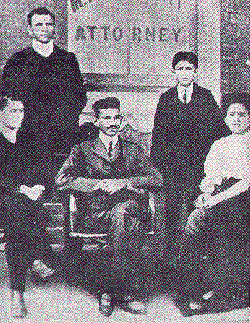

In the 'Dark Continent' |
Gandhi landed at Durban in May 1893. His employer Dada Abdulla, one of the wealthiest Indian merchants in Natal, took him to see the Durban court. When the European magistrate ordered Gandhi to take off his turban, he refused, left the court- room and wrote a letter of protest in the local press in which he was mentioned "as an unwelcome visitor". The experience in Durban, however, was nothing compared with what befell him in the course of his journey from Durban to Pretoria. When his train reached Maritzburg late in the evening, he was ordered to leave the first class compartment and shift to the van compartment. He refused, but was unceremoniously turned out of the carriage. It was a bitterly cold night as he crept into the unlit waiting- room of Maritzburg station and brooded over what had happened. His client had given him no warning of the humiliating conditions under which Indians lived in South Africa. Should he not call off the contract and return to India? Should he accept these affronts as part of the bargain? So far Gandhi had not been conspicuous for assertiveness; on the contrary he had been pathologically shy and retiring. But something happened to him in that wind-swept waiting- room of Maritzburg railway station as he smarted under the insult inflicted on him. The iron entered his soul. In retrospect, this incident seemed to him as one of the most creative experiences of his life. From that hour, he refused to accept injustice as a part of the natural- or unnatural- order in South Africa. He would reason, he would plead; he would appeal to the better judgment and the latent humanity of the ruling race; he would resist, but he would never be a willing victim of racial arrogance. It was not so much a question of redeeming his own self-respect as that of his community, his country, even of humanity.  M. K Gandhi, Attorney, with his colleagues, at Johannesburg The helpless resignation of the mass of Indian settlers, the fact that they were illiterate, had few rights and did not know how to assert the rights they had. All this had the miraculous effect of dissipating young Gandhi’s own diffidence. The feeling of inferiority which had dogged him as a student in England and as a budding lawyer in India vanished. In Bombay he had been unable to face a small cause court but one of the first things he did on arrival at Pretoria was to convene a meeting of the Indian residents "to present to them a picture of their condition in Transvaal". During the next twelve months, Gandhi was busy with the civil suit which had brought him to Pretoria. In June 1894, he returned to Durban to sail for India. At the farewell party which his grateful client Dada Abdulla gave him at Sydenham, a pleasant suburb of Durban, Gandhi happened to glance through the pages of the Natal Mercury, and learnt that a bill was being introduced into the Natal Legislature to disfranchise India settlers. Gandhi’s host and other Indian merchants present at the party were unable to throw any light on this measure. They knew enough English to be able to converse with their white customers, but few of them could read newspapers, much less follow the proceedings of the Natal Legislature. They had come to Natal for trade, and politics did not interest them. They had not yet realized that politics could affect their trade. "This is the first nail into our coffin", was Gandhi’s comment. The Indian merchants pleaded with him to stay on in Natal to take up the fight on their behalf. Gandhi agreed to defer his stay for a month. Gandhi lost no time in settling down to work; the farewell party converted itself into a political committee to plan Indian opposition to the bill. A sound instinct seems to have guided the young barrister in organizing his first political campaign. He infused a spirit of solidarity into the heterogeneous elements composing the Indian community, and brought home the implications of the disfranchising measures not only to his own people, but to the saner section of the European public opinion and the Natal Government Most important of all, he gave the widest publicity to his campaign to quicken the conscience of the peoples and Governments of India and Great Britain; through petitions to the legislatures, statements in newspapers, letters to prominent persons in Natal, Britain and India, and through public meeting, Gandhi stressed the justice of the Indians, case. All this created a great stir but the disfranchising bill was nevertheless passed by the Natal Legislature. On the insistence of his Indian friends in Durban, Gandhi agreed to prolong his stay in Natal, and was enrolled as an advocate to the Supreme Court. Since he retaining fees to produce a minimum 300 a year which he reckoned enough to pay his way in Durban. |